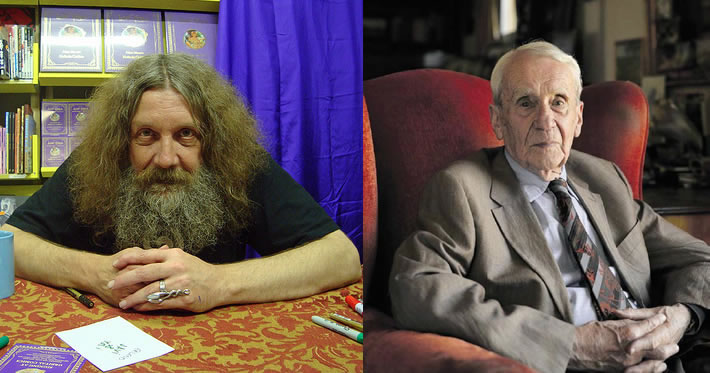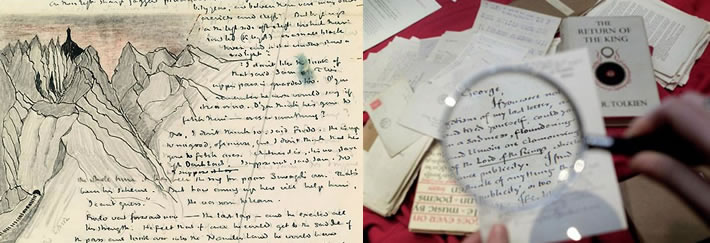The Jackson Quibble: Is the new Hobbit flick harming the greater good? (20.01.13 by New York Film Academy Faculty) -
Comments
Let's be honest from the off: the new Hobbit movie is disappointing at best.
That's not in dispute with the majority of people, both hardcore fans and general moviegoers alike. But what's open to debate is how it affects the entire Tolkien heritage.
Is a poor movie that urges more people towards the source material a good thing, or does the recent half-hearted incantation harm the legacy of Middle-earth in the public consciousness?
Tolkien Wept
Firstly, I'll point out that if you haven't seen Peter Jackson's latest outing, you won't have to in order to follow the discussion here. It's not even recommended – the film is as bloated and cartoonishly dumb as the reports you might have heard. It's also way more removed from the literature than the LOTR trilogy, and as a disclosure of interests, I liked those movies. A lot.
Somewhat predictably, Christopher Tolkien has been less than favourable about Jackson's interpretation of the Hobbit. In fact, he went positively Alan Moore in his appraisal of the film, breaking a decade-long interview silence to call it an ‘evisceration' of his father's work and that the only thing he's able to do at this point is turn his back on Jackson's output. One commentator asks whether we as Tolkien fans, at this point, should too.
Looking a Gift Horse in the Mouth?
Whenever the contention is brought up online, there are always a handful of people who accuse the Tolkien estate of having their lembas and eating it too – that nobody who has earned such wealth off the back of the movies should have the right to bemoan them. It's no secret that over 25 million copies of Lord of the Rings were sold in the three years after the Fellowship hit the silver screen.
What most people don't understand is that the movie rights were sold by JRR himself some forty years ago, and there's not a thing the Tolkien estate can do about it. As nobody on the planet has worked more fastidiously to preserve the integrity of the body of works, we have no reason to disbelieve that Christopher wouldn't use every penny of the royalty money to undo the movies if such a thing was possible. I'm certain he rues the day his father sold the movie rights for a retrospectively feeble £100,000.
Still, it can be argued that the movies have not actually tarnished anything. The books are still sitting in shelves and in bookstores, unmolested, and being picked up by a massively increasing number of hands following the mainstream popularity of the movies.
A legend as entrenched in our culture as Lord of the Rings is always going to propagate itself in other media outside of the books – it already began with the Hobbit animation in 1978, long before Peter Jackson was shooting splatter horrors in his free time, and will continue to do so long after Christopher will be able to argue for purism. If a budding student at the New York Film Academy animation school wants to take on the daunting task of turning The Silmarillion into a six-hour long cartoon epic, they should be applauded and wished the very best of luck.
And despite their quarry with Jackson, the Tolkien children – who, it's worth pointing out, have all had immensely successful careers away from their father's work – have amassed more money to pass on to future generations as a result, even if they had to fight New Line tooth and nail to get what was owed, and even if they didn't want the cash.
So What's The Harm?
The original Lord of the Rings movie trilogy had a demonstrably big effect on bringing new readers to the books. If we're honest, pre-2001 there was a real dichotomy between those who considered tolkien's works as a culturally rich family classic and those who only saw a dusty tome of fantasy geekdom. The movies helped break that stigma and reached people who otherwise wouldn't have touched the franchise with a bargepole.
My worry is that with the latest Hobbit movie, things may go the other way. There's already a sense of fatigue in the air over An Unexpected Journey, with more people than not wishing things had been left at Lord of the Rings (or at the very least that Jackson had not drawn the Hobbit out into three parts).
Just as the mid-2000s saw excitement spill back to the books, the current boredom with the movies can easily do the same. Worse than that, there may be bigger implications of tolkien-related ennui…
The Bigger Picture
The uplift in tourism to New Zealand is great, as is the impact it has had on small businesses (from people who make lotr-related jewelry to that one passionate farmer who was licensed to make official Middle-earth tea).
But in the face of much yawning at the prospect of two more Hobbit movies, we can expect the shoddy handling of the movies to kill a lot of other Tolkien projects dead in the water.
If the general population feel oversaturated at this stage and box office takings plummet, that spells disaster for the prospects of things like the Lord of the Rings theme park (only rumours for now, but apparently even the Tolkien estate are okay with the idea). It also doesn't bode well for any serious attempt at getting our manuscripts back from Marquette University in the US, which were sold by Tolkien for a paltry $5000, or for opening a dedicated museum which we've wanted to see for a long time.
In fact, I was very surprised to discover that there are no dedicated Tolkien museums save for one small collection in the Netherlands (of all places). I emailed the lovely curator, a gentleman named René, to ask if he knew of any others, or whether the claim of being the only such museum was still correct. "Yes, I am still the one and only," he swiftly replied, "although a dedicated museum will [also] open in Switzerland in September this year."
The Solution
If the Tolkien estate are powerless to stop the money machine from churning out more films, I'd love to see them use the royalty money to fund projects such as a Tolkien museum or to patch up Perrott's Folly.
I'm not saying fighting New Line's bureaucracy or its creative decisions is a bad move – far from it – but imagine how great it would be if they invested half the time and money they spent fighting the films into promoting Tolkien as they'd like his work to be remembered.
I for one would love to see Christopher open a dedicated museum in Oxford, filled with pieces of his own childhood and other artifacts which would interest fans of his father's work.
I'd love to ride a rollercoaster into the simulated fires of Mount Doom.
I want to see the original manuscripts return home.
Most of all, I guess I just want to see Peter Jackson and the Tolkien estate to kiss and make up…
… high fantasy indeed.
Spread the news about this J.R.R. Tolkien article:


